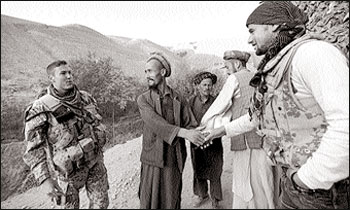In Afghanistan 'human maps' help fight Taliban
"I'm 105 years old," said Bismiullah, an old man stopped by a patrol
in southern Afghanistan as part of military efforts to map the
population in the battle against the Taliban.
Asked what he thinks of the US army, the Afghan army and the Taliban,
Bismiullah responded: "I like myself and my family, that's it."
|

Soldiers talking to locals |
Questioned who is in charge in the area, he was similarly direct:
"Allah is my chief."
The elderly man was stopped by a US-Afghan patrol in the village of
Charkusah in the Zahri district of Kandahar, the southern Afghan
province seen as the heart of the Taliban insurgency.
Troops in the region and across Afghanistan are gathering
photographs, fingerprints and employment details as well as canvassing
opinions from local residents to find out what they want for the
war-racked province.
The goal is to strengthen relations between pro-government forces and
the local population.
But the information gathered can also help troops catch Taliban
fighters, for example by matching fingerprints on home-made bombs or
guns.
Formally known as human terrain mapping, the process is a key strand
of the strategy to build better ties between pro-government forces and
local people as the war enters arguably its most important year.
International troops in Afghanistan, around two-thirds of whom are
from the United States, are due to start limited withdrawals in July
ahead of a scheduled transition of responsibility for security to Afghan
forces in 2014.
Human terrain mapping was first used in its current form in Iraq in
2007 but experts say it also draws on the lessons of previous
counterinsurgency campaigns such as in Vietnam.
Counterinsurgency theory holds that the key to winning such wars is
to destroy the insurgents' political control over the population.
Identifying who is an innocent civilian and who is an insurgent is a
vital element.
However, gathering reliable information is not always easy in a
country where many desperately poor rural people do not know basic
information about th
emselves, such as their age.
Afghanistan has not had a census since 1979, the year of the Soviet
invasion, amid security concerns across the war-torn country.
"What we do here comes from previous experience in Iraq and other
parts of Afghanistan," explained Lieutenant Wes Pennington of Taskforce
Strike, 101st Airborne.
"The Taliban try to make their own COIN (counterinsurgency) tactics,"
he added. "But we have more to offer, we're better at it."
In Charkusah, the Taliban is also trying to build support among the
population, handing out money and buying harvests of marijuana and opium
which they then sell on to finance their fighting, Pennington said.
People in the village are notably reluctant to talk about the
Islamist insurgents.
Mohammad Sahim, a 32-year-old farmer, stressed that he knows 'nothing
at all'" about the Taliban. As for improvements he would like to see in
the local area, he stresses "food, water and a hospital".
Staff Sergeant Alan Cable, who is asking the questions, said that
such reticence about the Taliban is typical. "People usually say that
they don't know anything," he explained.
Captain Brett Matzenbacher, in charge of the nearby Pashmul South
base, is realistic when it comes to the power of the Taliban.
"The population is Taliban-influenced," he said. "But we provide an
alternative to the Taliban, a district governor who is an official
authority."
Dawn |



